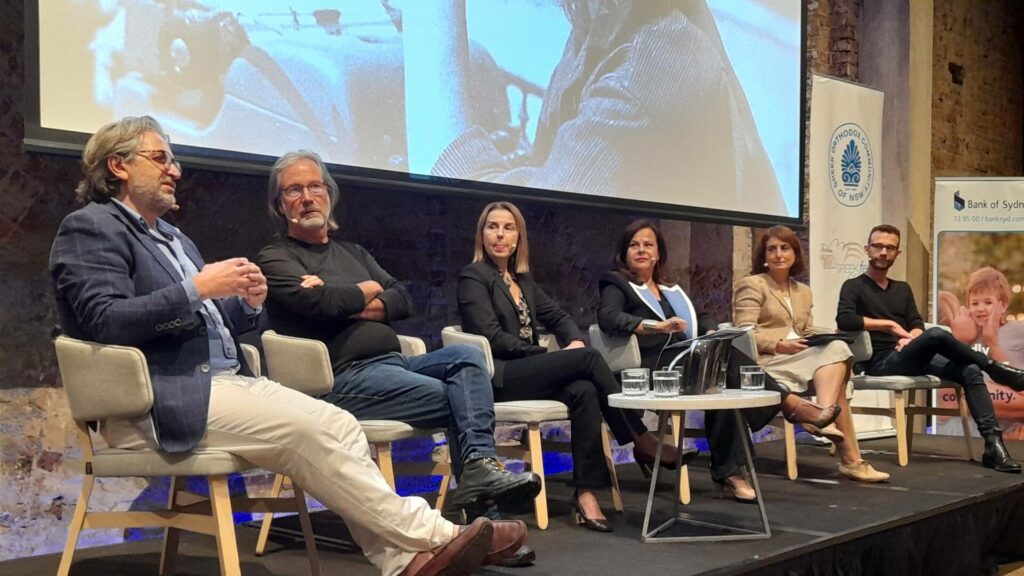The Greek-Australian Writers’ Festival proved to be one of the most successful events of this year’s 41st Greek Festival of Sydney, focusing intently on Australian author Charmian Clift and highlighting the impact their writing had in describing life on two islands.
Clift, along with her husband and fellow writer George Johnston and their family lived in the 50s and 60s in Kalymnos and Hydra.
As was said by panellists in the Writers’ Festival, few have truly captured the essence of Greece in written form as Clift did, especially those who are not natives.

The event was held on Sunday at Beta Bar in the Hellenic Club of Sydney and was presented by the Greek Festival of Sydney (organised by the Greek Orthodox Community of NSW) and UTS Journalism and Writing.
The day was divided into seven sessions, capping off with a discussion of Clift’s book ‘Mermaids Singing’ which was recently translated into Greek by translator Fotini Pipi with the title “Το Τραγούδι της Γοργόνας”.
Australia’s Ambassador to Greece Arthur Spyrou zoomed in with Ms Pipi from Athens, with Charmian Clift’s biographer Nadia Wheatley physically in attendance to thoroughly address the impact and significance of Clift’s book covering her time on Kalymnos.

Her skill from a writing standpoint was a key point of the session which Ms Pipi spoke very highly of.
“She is masterful in her writing and that was challenging to translate but it was also fascinating, and I think I did a good enough job,” Ms Pipi said, whose translation of Clift’s memoir on Hydra, Peel Me a Lotus, into Greek is set to be released later this year.
“It translated well into Greek. She didn’t know the language but maybe she got influenced or maybe it just suited her, her way of thinking is not very foreign to the Greek way of thinking.”
Mr Spyrou likewise noted her ability to capture the areas in extraordinary fashion.

“A lot of people come to me and say she has described Greece and Kalymnos perhaps better than someone would who is actually living that life because she was both a participant and an observer,” the diplomat said during the discussion.
Ms Wheatley identified that Clift was in Kalymnos to support her husband as a literary research assistant and collaborator for his book ‘The sponge divers’, rather than her own writing endeavours.
It was her experiences engaging with the people and the area that subsequently let her write extensively on what she had witnessed, and she thus was the titular mermaid singing.
“She was normally a terribly slow writer and she had been hampered by writing in tandem with George but suddenly for the first time, her own voice sung out, the voice of the mermaid,” said Ms Wheatley during the discussion.

She highlighted further the observations Clift made on the “matriarchal nature of Kalymnian society” e.g. how property was handed down the line of female generations.
The Festival’s Director, Dr Helen Vatsikopoulos (Journalist and Professional Fellow at UTS) labelled Clift, who would have turned 100 years old this year, a “woman ahead of her time” who managed in her two books, ‘Mermaids Singing’ and ‘Peel Me a Lotus’, to capture Greece “in a time capsule in an era that no longer exists”.
Dr Vatsikopoulos stated this year’s Festival made a conscious effort to also include the views non-Greeks have on Greece.
“I think it’s really important to sometimes look at how ‘outsiders’ see us and interpret our lives and our customs. And this was really the focus of the festival this year because there are so many people turning to Greece as inspiration,” the event’s Director told Neos Kosmos.
“They can reveal truths that we cannot see and tell us things about ourselves we are not aware of.”

In addition to the main session on Clift specifically, a second discussion took place covering the research of Paul Genoni (Adjunct Associate Professor with the School of Media, Culture and Creative Arts at Curtin University) and Tanya Dalziell (Professor of English and Literary Studies at the University of Western Australia).
The two co-edited a book titled ‘Telling Stories: Australian Life and Literature, 1935-2012, and co-author of Half the Perfect World: Writers, Dreamers and Drifters on Hydra, 1955-1964’ which discussed their research on the impact of the island of Hydra on authors and artists.
Among these creatives were both Clift and Johnston as well as legendary singer Leonard Cohen from when he was still an unknown aspiring poet/musician.
This panel was chaired by author and former managing director of ABC, David Hill, and focussed heavily on the thousands of unpublished photos taken by Johnston’s Chinese-American friend formed during WWII, James Burke, for Life Magazine.
There were five other sessions on the program outside of the main two, one of which being an open panel discussion on the topic “Are We White Yet?” that was recorded by the ABC’s Radio National Big Ideas program.
The wide schedule covered countless works from Greek-Australian and Australian writers and photographers alike, a change from last year’s event as Dr Vatsikopoulos stated a desire to fulfill the Festival’s goal of “bringing together Greeks and non-Greeks in a celebration of words, storytelling and writing”.

Sessions:
Session 1: Mothers, Sons and Daughters: Journeys
– Susan Johnson (author) wrote a memoir titled ‘Aphrodite’s Breath’ on her experiences living in the foreign (to them) climate of Kythera with her 85-yr-old mother Barbara.
– Peter Polites (novelist) wrote a love letter from a son to a mother titled ‘God Forgets About the Poor’, which focuses on his mother’s journey from Greece to Australia.
– Facilitated by Sydney Morning Herald journalist Anna Patty.
Session 2: Playing with fire: Fusing history with fiction
– Gail Jones (Author) wrote a book titled ‘Salonika Burning’ inspired by the Great Thessaloniki Fire of 1917.
– Kate Forsyth (Author) wrote a book titled ‘The Crimson Thread’ that is set in Crete during the Nazi Occupation, while also reimagining the famed myth of the Minotaur in the Labyrinth.
– Chaired by Dr Phil Kafcaloudes, author of ‘Someone Else’s War’, a novel based on his grandmother’s WW2 experience, and ‘Australia Calling: The ABC Radio Australia Story’.

Session 3: The Historians’ Odyssey: Greece and Australia
– Nicholas Doumanis (Associate Professor of History at UNSW) collaborated on The Edinburgh History of the Greeks, written from a transnational perspective that includes the diaspora and minorities.
– Jim Claven (written works on the Greek-Australian military relationship through personal stories of soldiers and their lived experiences through accessing diaries and photographs). His latest book, ‘Grecian Adventure: Greece 1941, Anzac Trail Stories and Photographs follows his previous book, Lemnos & Gallipoli Revealed: A Pictorial History of the Anzacs in the Aegean 1915-16.’
-Tony Maniaty (journalist, photographer and author) discusses the different ways of telling history in this session.
Session 4: Are We ‘White’ Yet? Let’s talk diversity.
– Panel discussion on whether Greek-Australians are now considered ‘white’: including Helen Vatsikopoulos, Phil Kafcaloudes, Nicholas Doumanis, Paul Farrell (journalist), Mary Coustas (Actress) and Anna Patty.
– Recorded for one hour to be broadcast on the ABC’s Big Ideas program for Radio National.

Session 5: Picture this: Power of visual storytelling
– Effy Alexakis (documentary photographer) and Tony Maniaty discuss the importance of photography in documenting and creating knowledge.
– Facilitated by Dr Phil Kafcaloudes.
Session 6: The Write Stuff: Hydra’s Literary and Photographic Age
– Paul Genoni and Tanya Dalziell discuss their book ‘Telling Stories: Australian Life and Literature, 1935-2012, and co-author of Half the Perfect World: Writers, Dreamers and Drifters on Hydra, 1955-1964’.
– Chaired by David Hill (Chairman of the Australians for the Return of the Parthenon Sculptures and President of the International Association for the Reunification of the Parthenon Marbles)
Session 7: 100 years of Charmian Clift – Translating Greek Island life to the world
– Fotini Pipi, Arthur Spyrou and Nadia Wheatley discussing Charmian Clift’s book on the culture of Kalymnos, Mermaid Singing.
– Chaired by Dr Helen Vatsikopoulos.








